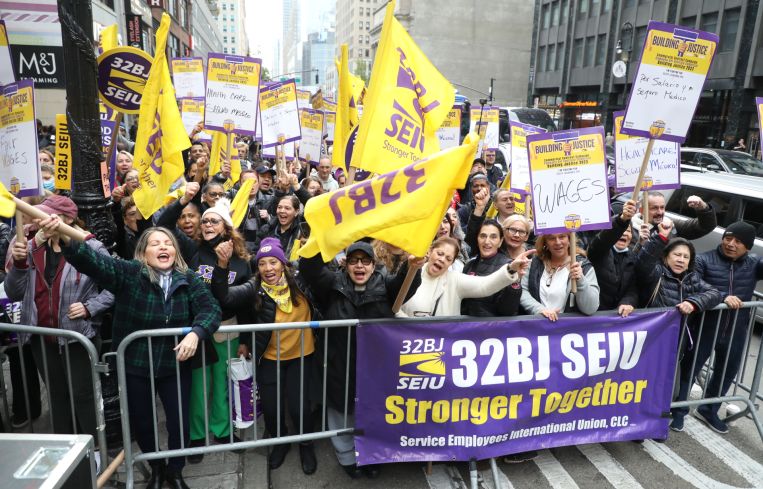NYC Building Workers Avert Strike After Reaching Tentative Contract
By Nicholas Rizzi December 28, 2023 12:44 pm
reprints
Thousands of New York City’s commercial building workers won’t start 2024 with a strike after their union and landlords reached a tentative new contract early Thursday morning.
The Realty Advisory Board (RAB) — which represents owners of about 900 commercial buildings — and the 32BJ Service Employees International Union hammered out an agreement that largely gets what the union was fighting for: employers continuing to fully cover building workers’ health insurance, wage increases and improvements.
RAB has argued the union needed to make concessions because of the dire state of the city’s office market. The tentative contract allows for an early retirement incentive program and “a streamlined process” to change staffing levels at buildings that need fewer workers because remote work has reduced office populations, according to RAB.
“Today we found a common path forward with the RAB that rewards workers appropriately and meets the moment for the New York City commercial real estate industry,” Manny Pastreich, the president of 32BJ, said in a statement. “We won a strong agreement that moves working New Yorkers forward.”
Once ratified by the union, the contract will kick in on Jan. 1 and last until Dec. 31, 2027. As part of the agreement, commercial building workers will end the contract with a wage increase of 3.02 percent, or $149 per week, bumping the typical annual salary to more than $69,000, according to RAB and the union.
Workers will also get a $3,000 bonus in March and a 10 percent increase to pension benefits for future retirees under the contract. It also adds an early retirement program starting for members at 60 years old who have 15 years on the job. The program will offer a $20,000 401K contribution, termination pay and a 5 percent pension improvement. It also allows retirees to keep their health benefits until they are 65 years old, according to the union.
“We’re proud to come to an agreement that reflects the economic realities that commercial real estate faces by creating the flexibility the industry needs to survive for the long term,” Howard Rothschild, the president of RAB, said in a statement.
The contract agreement seemed like a longshot earlier this month as 32BJ and RAB were at an impasse over changes to the city’s 20,000 commercial building employees’ wages and health benefits. On Dec. 20, 32BJ authorized a strike that would have started after their current contract ran out, and Pastreich told Commercial Observer at the time the two sides had made little progress since starting contract negotiations in November.
Nicholas Rizzi can be reached at nrizzi@commercialobserver.com.

![Spanish-language social distancing safety sticker on a concrete footpath stating 'Espere aquí' [Wait here]](https://commercialobserver.com/wp-content/uploads/sites/3/2026/02/footprints-RF-GettyImages-1291244648-WEB.jpg?quality=80&w=355&h=285&crop=1)

